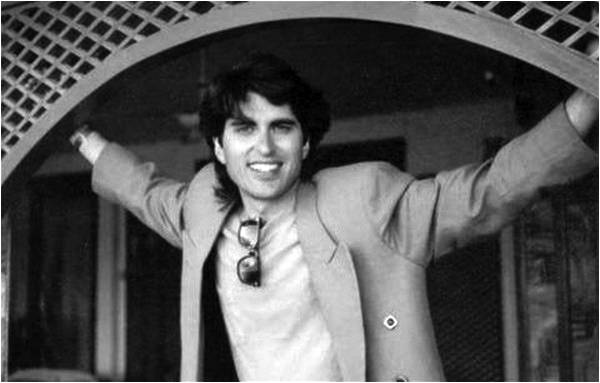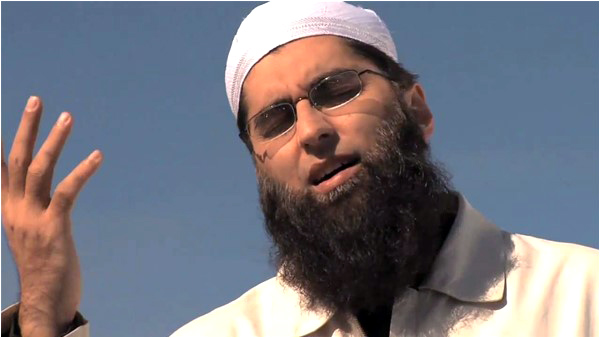
The 7th of December 2017, this year, marks the first death anniversary of singer and religious figure Junaid Jamshed (JJ). He was born on the 3rd of September 1954 in Karachi. His father Jamshed Akbar was a Group Captain in the Pakistan Air Force (PAF). Junaid was the second of four siblings.
Junaid graduated from an international boarding high school in Yanbu-al-Bahr in Saudi Arabia. He wanted to join PAF as a fighter pilot but his weak eyesight prevented this. He then entered the University of Engineering and Technology (UET) in Lahore where he studied mathematics and physics before declaring his interest in mechanical engineering. In 1990, he gained a Bachelorof Science degree in mechanical engineering. After mechanical engineering, he briefly worked as a civilian contractor and engineer for the PAF.

He later focused on his music career. The band Vital Signs began in 1986 with keyboardist Rohail Hyatt and bassist ShahzadHasan (Shahi). Junaid later joined them as a lead vocalist. The band began performing in various parts of the country after gaining a place in the underground music industry in Islamabad and Lahore. It was first noticed by music officials of PTV and a record deal was awarded by Rana Kanwal, a student of the National Academy of Performing Arts. Kanwal was given a task to make a music video and she wanted to make a video on any music band. The band than moved to Islamabad and began working on its first album, ‘Chehra’. During this time, the band caught attention of record producer and broadcaster Shoaib Mansoor, who also joined the band and worked for their first album.
Their first album was released in 1987 and it was a great success. Amongst the songs Dil Dil Pakistan was a spectacular success and it later became known as the second national anthem of Pakistan. The songs in the first album were a great hit and it gained much nationwide success. This success lifted the underground music industry to a national level. In 1991, their second album was released, which was not quite as successful as the first one. In 1993 along with Shoaib Mansoor, the band released their third album ‘Aitebar’. In 1995, the fourth and last album was released, ‘Hum Tum’, after which the band was disbanded. In 2013, the band reunited and sang a song for the general elections, Naya Pakistan. The song was a great success and it was broadcast frequently on most TV channels during the elections.
In 1994, Junaid Jamshed released his first solo album, ‘Junaid of Vital Signs’. The name was later changed to ‘Tumhara aur Mera Naam’ by the record producers. In 1998 after leaving Vital Signs, his second solo album was released: ‘Us Rah Par’. It was successful affair and the most successful songs were Aankhon Ko Aankhon Ne, Na Tu Aayegi, O Sanama and Us Rah Par. In 2000, a third album was released: ‘The Best of Junaid Jamshed’. It consisted of remixes of previous albums. In 2001, his last musical album ‘Dil Ki Baat’ was released.
In 2003, BBC World Service conducted a poll to choose the most popular songs. Around 7,000 songs were selected from all over the world. According to BBC, people from 155 countries voted in the poll. Dil Dil Pakistan was the third amongst the ten songs.
After 2001, Junaid avoided media interaction. His last two albums did not do well. He was facing some financial issues and it was once again Shoaib Mansoor who came to help him. It was frequently reported that Junaid Jamshed had distanced himself from music and had been praying five times a day in a nearby mosque. Finally in 2004, he left the world in shock when he announced that he was quitting music and ‘devoting his entire life to Islam’. In the same year he began his clothing store, J,. which became a success.

In 2005, his first naat was released, Jalwa e Janaan, which was a great success. In 2010 he appeared as an anchor on television for the first time when he hosted shows on Geo TV. In 2013, he hosted the Ramzan transmission on ARY Digital, ‘Shan e Ramzan’ with Waseem Badami.
In 2014, he found himself accused of blasphemy by certain quarters and after a few days he apologised in a video message.
In February 2016 Junaid Jamshed was attacked in Islamabad airport by some individuals, who insisted that he was a blasphemer. The government of Pakistan took legal action – within a week, his attackers were arrested.
On the 7th of December, 2016, Junaid Jamshed and his wife Nahya Junaid died in a plane crash at Havelian. Junaid was en route to Islamabad to deliver a Friday sermon there. He is survived by his first wife Ayesha, three sons and a daughter. His death left millions of Pakistanis in shock. The funeral prayers were offered at Moin Khan Cricket Academy in Defence Karachi. The funeral prayers were led by Maulana Tariq Jameel. Many actors, singers, cricketers and figures from the Tablighi Jamaat attended the funeral prayers. Junaid Jamshed was buried in Dar ul Uloom Karachi.
Junaid Jamshed is, quite simply, an icon. He set aside popularity and a successful musical career, believing that his faith demanded that. His naats are as successful as any of his other endeavours.
His album ‘Us Rah Par’ reminds me of my childhood: I was two years old and couldn’t stop singing the songs, especially Na Tu Aayegi.
Among his naats, my personal favourites are Ilahi Teri Choukhat, Muhammad (PBUH) Ka Rawza and Kya Haseen Sama Hoga. To listen to the last cannot but make me feel almost as if I stand in front of the Kaabah…
The author is a student of accounting in Karachi
Junaid graduated from an international boarding high school in Yanbu-al-Bahr in Saudi Arabia. He wanted to join PAF as a fighter pilot but his weak eyesight prevented this. He then entered the University of Engineering and Technology (UET) in Lahore where he studied mathematics and physics before declaring his interest in mechanical engineering. In 1990, he gained a Bachelorof Science degree in mechanical engineering. After mechanical engineering, he briefly worked as a civilian contractor and engineer for the PAF.

He later focused on his music career. The band Vital Signs began in 1986 with keyboardist Rohail Hyatt and bassist ShahzadHasan (Shahi). Junaid later joined them as a lead vocalist. The band began performing in various parts of the country after gaining a place in the underground music industry in Islamabad and Lahore. It was first noticed by music officials of PTV and a record deal was awarded by Rana Kanwal, a student of the National Academy of Performing Arts. Kanwal was given a task to make a music video and she wanted to make a video on any music band. The band than moved to Islamabad and began working on its first album, ‘Chehra’. During this time, the band caught attention of record producer and broadcaster Shoaib Mansoor, who also joined the band and worked for their first album.
Their first album was released in 1987 and it was a great success. Amongst the songs Dil Dil Pakistan was a spectacular success and it later became known as the second national anthem of Pakistan. The songs in the first album were a great hit and it gained much nationwide success. This success lifted the underground music industry to a national level. In 1991, their second album was released, which was not quite as successful as the first one. In 1993 along with Shoaib Mansoor, the band released their third album ‘Aitebar’. In 1995, the fourth and last album was released, ‘Hum Tum’, after which the band was disbanded. In 2013, the band reunited and sang a song for the general elections, Naya Pakistan. The song was a great success and it was broadcast frequently on most TV channels during the elections.
After 2001, Junaid avoided media interaction
In 1994, Junaid Jamshed released his first solo album, ‘Junaid of Vital Signs’. The name was later changed to ‘Tumhara aur Mera Naam’ by the record producers. In 1998 after leaving Vital Signs, his second solo album was released: ‘Us Rah Par’. It was successful affair and the most successful songs were Aankhon Ko Aankhon Ne, Na Tu Aayegi, O Sanama and Us Rah Par. In 2000, a third album was released: ‘The Best of Junaid Jamshed’. It consisted of remixes of previous albums. In 2001, his last musical album ‘Dil Ki Baat’ was released.
In 2003, BBC World Service conducted a poll to choose the most popular songs. Around 7,000 songs were selected from all over the world. According to BBC, people from 155 countries voted in the poll. Dil Dil Pakistan was the third amongst the ten songs.
After 2001, Junaid avoided media interaction. His last two albums did not do well. He was facing some financial issues and it was once again Shoaib Mansoor who came to help him. It was frequently reported that Junaid Jamshed had distanced himself from music and had been praying five times a day in a nearby mosque. Finally in 2004, he left the world in shock when he announced that he was quitting music and ‘devoting his entire life to Islam’. In the same year he began his clothing store, J,. which became a success.

In 2005, his first naat was released, Jalwa e Janaan, which was a great success. In 2010 he appeared as an anchor on television for the first time when he hosted shows on Geo TV. In 2013, he hosted the Ramzan transmission on ARY Digital, ‘Shan e Ramzan’ with Waseem Badami.
In 2014, he found himself accused of blasphemy by certain quarters and after a few days he apologised in a video message.
In February 2016 Junaid Jamshed was attacked in Islamabad airport by some individuals, who insisted that he was a blasphemer. The government of Pakistan took legal action – within a week, his attackers were arrested.
On the 7th of December, 2016, Junaid Jamshed and his wife Nahya Junaid died in a plane crash at Havelian. Junaid was en route to Islamabad to deliver a Friday sermon there. He is survived by his first wife Ayesha, three sons and a daughter. His death left millions of Pakistanis in shock. The funeral prayers were offered at Moin Khan Cricket Academy in Defence Karachi. The funeral prayers were led by Maulana Tariq Jameel. Many actors, singers, cricketers and figures from the Tablighi Jamaat attended the funeral prayers. Junaid Jamshed was buried in Dar ul Uloom Karachi.
Junaid Jamshed is, quite simply, an icon. He set aside popularity and a successful musical career, believing that his faith demanded that. His naats are as successful as any of his other endeavours.
His album ‘Us Rah Par’ reminds me of my childhood: I was two years old and couldn’t stop singing the songs, especially Na Tu Aayegi.
Among his naats, my personal favourites are Ilahi Teri Choukhat, Muhammad (PBUH) Ka Rawza and Kya Haseen Sama Hoga. To listen to the last cannot but make me feel almost as if I stand in front of the Kaabah…
The author is a student of accounting in Karachi

